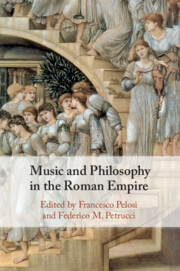Book contents
- Music and Philosophy in the Roman Empire
- Music and Philosophy in the Roman Empire
- Copyright page
- Contents
- Notes on Contributors
- Acknowledgements
- Abbreviations
- Introduction
- Chapter 1 The Scala Naturae and Music
- Chapter 2 Music and Plutarch’s Platonic Cosmos
- Chapter 3 The Harmoniser God
- Chapter 4 Alexander of Aphrodisias and Musical Models for Ontological Enquiries
- Chapter 5 How to Resist Musical Dogmatism
- Chapter 6 Shifting Epistemological Perspectives in Ptolemy’s Harmonics
- Chapter 7 Musical Imagery in Clement of Alexandria and Origen
- Chapter 8 Plotinus on Music, Rhythm, and Harmony
- Chapter 9 Porphyry’s Commentary on Ptolemy’s Harmonics
- Chapter 10 The Music of the Virtues in Late Ancient Platonism
- Chapter 11 Harmonics as Theological Paradigm in Proclus
- Chapter 12 Calcidius on Cosmic Harmony
- Chapter 13 Harmonia in Philoponus’ Commentary on Nicomachus’ Introduction to Arithmetic
- Bibliography
- Index Locorum
- General Index
Chapter 4 - Alexander of Aphrodisias and Musical Models for Ontological Enquiries
Published online by Cambridge University Press: 27 November 2020
- Music and Philosophy in the Roman Empire
- Music and Philosophy in the Roman Empire
- Copyright page
- Contents
- Notes on Contributors
- Acknowledgements
- Abbreviations
- Introduction
- Chapter 1 The Scala Naturae and Music
- Chapter 2 Music and Plutarch’s Platonic Cosmos
- Chapter 3 The Harmoniser God
- Chapter 4 Alexander of Aphrodisias and Musical Models for Ontological Enquiries
- Chapter 5 How to Resist Musical Dogmatism
- Chapter 6 Shifting Epistemological Perspectives in Ptolemy’s Harmonics
- Chapter 7 Musical Imagery in Clement of Alexandria and Origen
- Chapter 8 Plotinus on Music, Rhythm, and Harmony
- Chapter 9 Porphyry’s Commentary on Ptolemy’s Harmonics
- Chapter 10 The Music of the Virtues in Late Ancient Platonism
- Chapter 11 Harmonics as Theological Paradigm in Proclus
- Chapter 12 Calcidius on Cosmic Harmony
- Chapter 13 Harmonia in Philoponus’ Commentary on Nicomachus’ Introduction to Arithmetic
- Bibliography
- Index Locorum
- General Index
Summary
At different places in his writings Alexander expands on Aristotle’s criticism of Pythagorean and Academic doctrines making numbers principles of beings. On these accounts, harmoniai and symphōniai are singled out as paradigmatic cases illustrating a more general explanatory strategy. This chapter analyzes Alexander’s understanding of this strategy and explores the extent to which he may or may not have found room for its use within his account of Aristotle’s philosophy. The chapter is divided into four sections. Section 1 outlines the Aristotelian background of the discussion; sections 2 and 3 focus on the textual evidence from Alexander’s writings (in particular: from the commentaries on Aristotle’s Metaphysics and De sensu, and from Alexander’s De anima). Finally, section 4 sets Alexander’s analysis within the broader context of Aristotelian metaphysics and sketches out a possible account of the interplay between the shaping of Alexander’s views and the development of different stances about the nature and role of forms, quantities and quantitative determinations both in opposition to the Pythagorean and the Platonic traditions and within the Peripatetic tradition as such.
Keywords
- Type
- Chapter
- Information
- Music and Philosophy in the Roman Empire , pp. 85 - 107Publisher: Cambridge University PressPrint publication year: 2020
- 1
- Cited by



